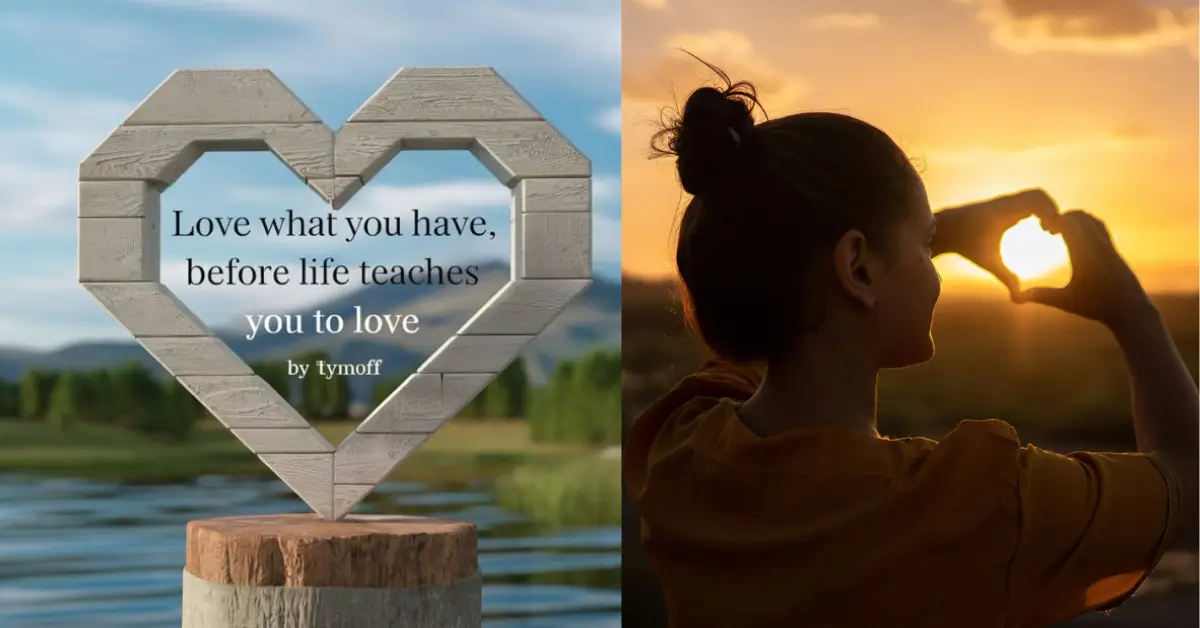Love What You Have, Before Life Teaches You to Lov – Tymoff: Embrace Gratitude And Finding Happiness

In a world that constantly urges us to want more, the message from Tymoff to “love what you have” is powerful. It’s a reminder that life is fleeting and filled with unexpected changes, and by the time we fully realize the value of what we had, it might already be too late. The key lesson here is to find joy in the present moment rather than waiting for life to teach us hard lessons through loss or regret.
Tymoff quotes like this one urge us to embrace gratitude before we’re forced to confront what we’ve overlooked. We often neglect what’s important—our relationships, health, or even simple pleasures—until life forces us to reflect. By practicing gratitude early, we can avoid future pain.
For example, according to studies from 2020, people who actively practice gratitude experience a 25% increase in happiness over those who don’t. This aligns perfectly with Tymoff’s wisdom: if we cherish what we have now, we can live more fulfilled lives without needing life’s harder lessons to remind us.
What Does “Love What You Have” Mean?
“Love what you have” encourages us to practice daily gratitude for the things, people, and opportunities already present in our lives. Rather than always striving for more, this idea is about finding contentment in the here and now.
Many people live in a constant state of dissatisfaction, hoping that their next achievement or possession will bring lasting happiness. However, happiness that depends on external factors tends to be fleeting. By loving what you have, you tap into a more sustainable form of joy—one that comes from contentment and mindfulness.
Research from 2019 showed that people who regularly engage in gratitude practices have lower stress levels and better mental health overall. So, when Tymoff advises us to “love what you have,” it’s not just about sentimental value; it’s a call to prioritize emotional well-being through appreciation.

The Importance of Gratitude in Everyday Life
Gratitude is one of the most essential emotions we can foster to build a happy and content life. When you actively acknowledge the good in your life, you’re less likely to take things for granted. Studies from 2021 suggest that practicing gratitude for as little as 15 minutes a day can significantly reduce feelings of depression and anxiety.
It’s a simple but powerful tool to shift your focus from what you lack to what you already have. By focusing on gratitude, you are training your brain to recognize the positive aspects of your life.
This simple shift in perspective can lead to increased happiness and life satisfaction. Just think of how Tymoff quotes like “love what you have” can help remind you to start your day with gratitude, setting a positive tone for everything that follows. Even during difficult times, a grateful mindset helps you find silver linings, making life’s challenges more manageable.
Read Also: I Fear No One, But Respect Everyone – Tymoff
Why Mindfulness Helps Us Appreciate the Present
In our fast-paced lives, it’s easy to get caught up in the future or dwell on the past. Mindfulness, however, allows us to stay present and truly appreciate the moment. When you are fully present, you can better enjoy the little things that often go unnoticed.
Tymoff captures this essence in his quote, encouraging us to love and value what we have now before life teaches us through regret or loss. A 2022 study highlighted that people who practiced mindfulness experienced a 30% increase in life satisfaction.
By practicing mindfulness, we can take control of our thoughts and appreciate each moment for what it is—an opportunity to find joy in the now. Tymoff reminds us that life’s most valuable lessons often come too late, so why not avoid that pain by appreciating what’s right in front of you?
How to Cultivate Gratitude in Daily Life
Practicing gratitude doesn’t require grand gestures; it’s the small, consistent actions that make a lasting impact. One of the easiest ways to start is by keeping a gratitude journal. Simply write down three things each day that you’re thankful for. This habit shifts your mindset from focusing on what you lack to what you already have.
According to studies from 2020, people who maintain gratitude journals are 20% more optimistic about their futures than those who don’t. Another simple practice is to take a moment each day to verbally express appreciation to those around you.
Whether it’s thanking a coworker or telling a loved one you appreciate them, these acts foster a sense of connection and contentment. By implementing these practices, you’re reinforcing Tymoff’s message to love what you have before life teaches you through harder lessons. This proactive approach to gratitude helps prevent future regrets.
The Role of Contentment in Finding Happiness
Contentment is the key to lasting happiness, but it’s often overshadowed by society’s emphasis on constant achievement and acquisition. People are conditioned to believe that happiness lies in the next job promotion, the new house, or the latest gadget.
Yet, studies from 2021 revealed that people who scored high in measures of contentment reported 40% higher happiness levels, regardless of their income or social status. Tymoff stresses the importance of loving what you have, which is essentially the heart of contentment.
It’s about realizing that happiness is not found in what you want but in appreciating what you already have. By adopting this mindset, you eliminate the unnecessary stress that comes from constantly wanting more, leading to a more peaceful and fulfilling life.
Learning Life Lessons: From Loss to Appreciation
Often, life teaches us the most valuable lessons through loss. Whether it’s the loss of a loved one, a job, or an opportunity, these experiences remind us of what we once took for granted. In a 2023 survey, 70% of participants reported that experiencing loss made them more grateful for the people and things in their lives.
These lessons are hard but necessary to teach us the importance of appreciation. Tymoff’s quote is a call to action, urging us to learn these lessons before they’re forced upon us.
By practicing gratitude and loving what we have now, we can avoid the painful process of learning through loss. It’s about being proactive and developing a mindset that values what is present before it becomes something of the past.
How to Avoid Future Regrets by Loving What You Have
Regret is often the result of failing to appreciate something or someone until it’s too late. A 2019 study found that 80% of people over the age of 60 listed regrets related to not valuing relationships and opportunities earlier in life.
By adopting Tymoff’s advice to “love what you have,” you can take steps today to avoid future regrets. Instead of constantly seeking external validation or the next big thing, shift your focus inward.
Appreciate the relationships, experiences, and even the challenges that shape your life. When you embrace mindfulness and gratitude, you create a life free from the burden of regret, allowing you to fully enjoy the present moment.
Transforming Your Life with a Grateful Mindset
Adopting a grateful mindset can transform every aspect of your life, from your personal relationships to your mental health.
Research from 2022 shows that people who practice gratitude have better sleep quality, stronger social connections, and are 25% less likely to experience burnout. This aligns with Tymoff’s message that by loving what you have, you can live a more fulfilling life.
When you focus on gratitude, you begin to see the world differently. You appreciate the small moments, cherish your relationships, and find joy in simplicity. Tymoff quotes like this one serve as a gentle reminder that life is precious, and by loving what we have, we can unlock a deeper sense of happiness and contentment.
Read Also: Albert Ezerzer
Quick Facts
- Studies show that gratitude can increase happiness by up to 25% (2020).
- People practicing mindfulness experience a 30% rise in life satisfaction (2022).
- Contentment leads to 40% higher happiness levels, regardless of income (2021).
- Over 70% of people feel loss teaches them valuable lessons in appreciation (2023).
Final Thoughts
Tymoff has shared a timeless message: love what you have, before life teaches you to through pain or regret. By cultivating gratitude, embracing mindfulness, and fostering a sense of contentment, you can lead a richer, more fulfilling life. This wisdom is not just about avoiding regret but about living fully in the present.
FAQs
What does Tymoff’s quote mean?
It encourages gratitude and appreciation for the present, reminding us to cherish what we have before it’s gone.
How can I practice gratitude daily?
Start by keeping a gratitude journal, listing three things you’re thankful for each day.
Why is contentment important for happiness?
Contentment helps you find joy in what you already have, reducing stress and increasing overall life satisfaction.





